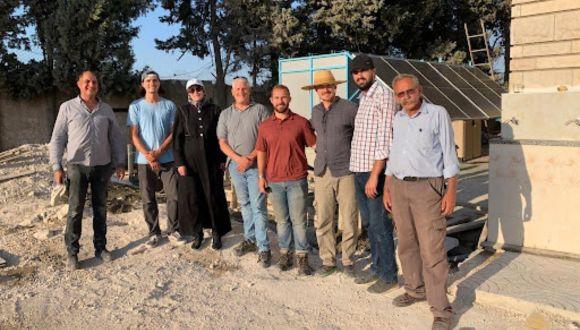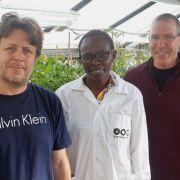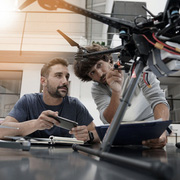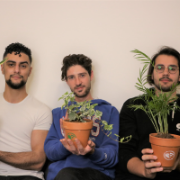Water Management in the Jordan Valley and Negev Desert
TAU Lecturer Works with Palestinian and Bedouin Communities to Advance Solutions
For more than a decade, Clive Lipchin has led the Center for Transboundary Water Management at the Arava Institute, working with local Bedouin and Palestinian partners to develop water and wastewater solutions. Since October 7 and the start of the war, that work has only continued.
“Since the war, not any of my projects has had to be cancelled or even postponed … if anything, our work is even more important now and the relationships continue,” says Lipchin, who is also a lecturer with Tel Aviv University’s (TAU’s) Porter School of Environmental Studies and with the international MA program in Conflict Resolution and Mediation.
Working with Palestinians and Bedouins
Lipchin and the Arava Institute work primarily with two different geographic groups on increasing local access to water and wastewater infrastructure: the Bedouin community in the Negev Desert, as well as the Palestinian community in the Jordan Valley of the West Bank. In each case, Lipchin works very locally with farmers and farming communities.
“We’re working with off-grid communities … and these are what we would consider under-serviced communities in terms of access to water and wastewater infrastructure,” he says.
“What we’re doing in both communities is trying to identify appropriate mechanisms, technologies and interventions for improving water and wastewater management access.”
“The populations we are dealing with are falling through the cracks and are not being serviced and that’s where we’re coming in,” says Lipchin.
For Lipchin, the fact that the work continues despite the current political climate is testament to the relationships the Arava Institute has built up over the years:
“This is the real element of success of our work … that these relationships are so strong, they can even override war.”
Advocacy Since October 7
While the focus remains on working long-term with farming communities to create water and wastewater infrastructure, Lipchin says he has also found himself since October 7 advocating in other ways. Currently, there are more than 100,000 Bedouin people in the Negev – about 20% of the total population in the area. Lipchin highlights that many of the Bedouin are unprotected from missiles and live in very open areas where there are no sirens.
“Since the war, Bedouin have been kidnapped, murdered … they have been impacted very significantly since October 7.”
“It is a very critical population that needs to be taken more seriously … and so we’re trying to find ways to build the partnerships and improve the situation and raise awareness,” says Liphin.
While Lipchin says that October 7 and the war do come up in conversation from time to time, he says that he does try not to politicize the relationships too much in order to continue to focus on the work at hand.
“The conversations are really more on the personal level, you know, how it’s been impacting me personally or my family, how it is impacting the Bedouin person I’m working with, or the person on the Palestinian side,” says Lipchin. “We don’t really get into the larger political discussion of what does this mean.”
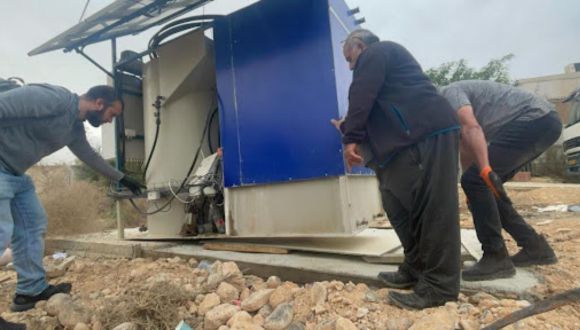
Installation of an off-grid wastewater treatment and reuse system to treat wastewater from the Al-Furaa Bedouin school.
And while Lipchin stresses that these relationships are not going to solve any wider conflict, he does see the work that he is doing as essential to long-term peacebuilding.
“We are really focused on the bottom level here of people-to-people engagement, and if you want long-term peace; that’s essential.”
“It doesn’t matter if there’s a peace agreement if the people don’t engage and don’t interact and don’t get to know one another and don’t see the benefit of partnership; then, you don’t have real peace,” says Lipchin.
Building Long-term Sustainability
As for the future, Lipchin doesn’t imagine his work will be slowing down any time soon; in fact, for the institute, the focus continues to be on funding and scalability. “How do we go from improving lives in two communities, to five, to 10 to 100 … scalability is really the long-term vision for us,” he says.
Moreover, Lipchin emphasizes that part of the reason that the relationships are so strong, is that the Arava Institute focuses on building long-term capacity: “We don’t just go in and give them a pump and say, good luck, you’ll have to manage the pump on your own afterwards.”
“We’re constantly engaged with the people we’re working with – it’s an ongoing thing and that’s why the relationships are so strong and sustainable.”
Interested in learning more from Lipchin? Check out his courses as part of TAU’s international MA in Conflict Resolution & Mediation or the international MA program in Environmental Studies.

